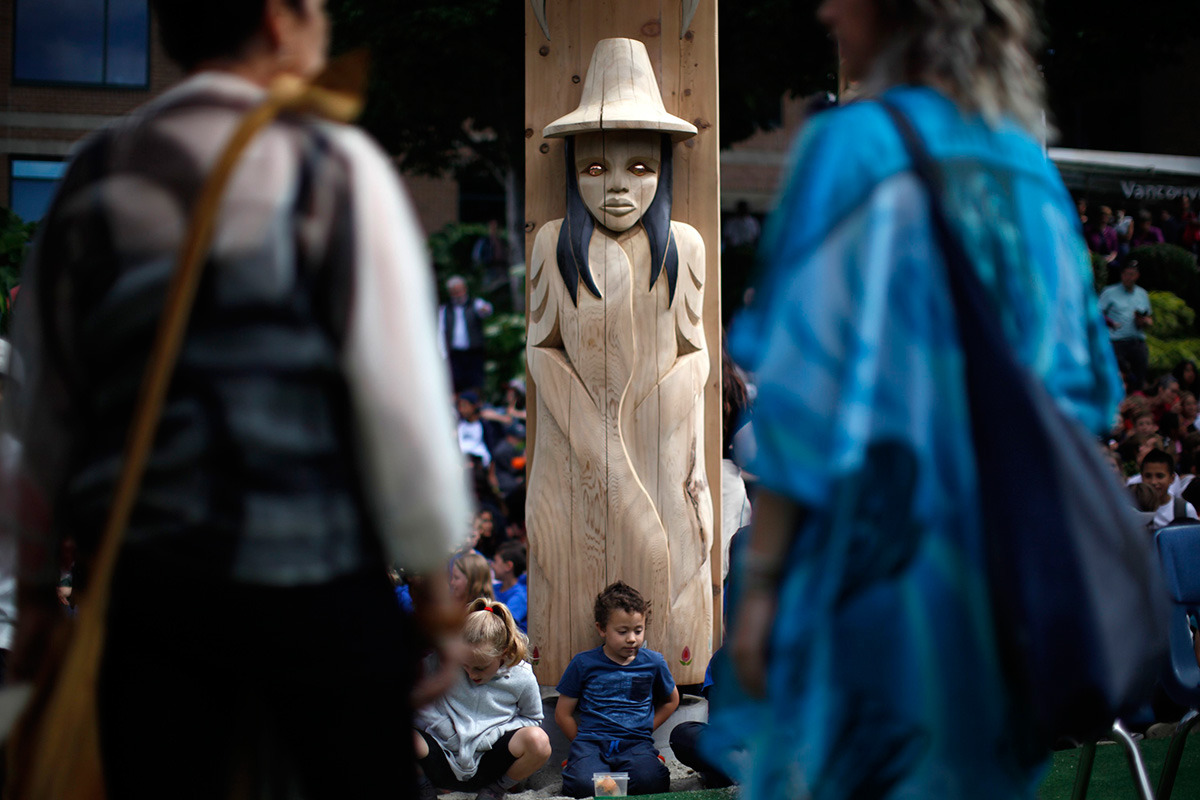Our lives are defined by an ever-growing network of responsibilities, a set of relationships that bind us to our families, neighbours, friends and loved ones. Every day we are obliged within this network to care for one another and ensure each other’s well-being.
As residents of Vancouver, we also have specific responsibilities to foster reciprocal relationships of care to the Musqueam, Squamish and Tsleil-Waututh First Nations whose lands we work and live on.
Vancouver city council will debate a motion this week to implement United Nations Declaration on the Rights of Indigenous Peoples. This is a significant opportunity to address the city’s colonial foundations and the ongoing marginalization of Indigenous peoples, while creating a process for co-governance and the recognition of Indigenous peoples’ right to self-determination.
The Truth and Reconciliation Commission of Canada called on municipal governments to fully adopt and implement the UN declaration as the framework for reconciliation. Though Vancouver council endorsed the declaration in a 2013 motion, as of last week it had yet to propose an implementation plan.
If this new city council motion passes, it will be the first of its kind in Canada.
As the framework for reconciliation, the UN declaration holds a wealth of opportunities for Vancouver. The recognition of Indigenous peoples’ rights can open doors to climate-conscious developments and policy, as we have seen in Squamish’s Senakw development; promote culturally appropriate services that better respond to the experiences of Vancouver’s marginalized communities; lead to greater recognition of the history of the land and the city; and create a more accountable and representative municipal governance structure.
My support for this motion is informed by three particular relationships.
1. My relationship as an uninvited guest on the territories of the Musqueam, Squamish and Tsleil-Waututh.
2. My relationship with the city as an urban Indigenous person and as an Indigenous rights holder.
3. My relationship and responsibility to our youth and to future generations.
As an urban Indigenous person who has sought a career and education away from my nation’s territory, I’m an uninvited guest on the traditional, unceded and ancestral territories of the Musqueam, Squamish and Tsleil-Waututh peoples. As a guest, I hold a particular responsibility to uphold the title and rights of these nations.
This makes me — and all other guests — responsible for supporting initiatives to reform and decolonize our governance structures to recognize the rights of Indigenous peoples. Our governments, federal, provincial or municipal, must be held accountable and adapt to honour these same relationships.
The UNDRIP principles provide the framework for our cities to develop these reciprocal relationships.
Consider just a few elements: Article 4 guarantees the right to self-determination and self-government. Article 5 recognizes the right to distinct political, legal, economic, social and cultural institutions and to participate in the political, economic, social and cultural life of the state. Article 18 guarantees the nations’ participation in decision-making in matters which would affect their rights. Article 19 requires the free, prior and informed consent to any measures that affect Indigenous rights. And Article 23 acknowledges the right to development, in particular health, housing and other economic social programs.
To meet these standards, we need a formalized relationship between the city and nations. It’s our responsibility as guests to support the three host nations in leading this discussion, and it’s the city’s responsibility to adequately support them to do so.
As an urban Indigenous person in Vancouver, I hold particular Indigenous rights that fall within the city’s responsibility to protect. I have the right to live free of discrimination, overt and systemic racism, and marginalization. I have the right to access clean water and housing, to safety and security, to be reflected and represented in our governing structures, to access education, and many others. In realizing these rights, the city must respond to the particular circumstances of Indigenous peoples.
The Metro Vancouver area is home to approximately 60,000 urban Indigenous peoples. Any plan to implement UNDRIP must make particular considerations for the rights of this community. The city has a responsibility and a relationship to the urban Indigenous community, which must be reflected within an UNDRIP implementation plan, yet this relationship must also be responsive, and respectful of the title and rights of the three host nations.
What that urban Indigenous representation will look like is a critical and complex question. The urban Indigenous community is large and incredibly diverse. It includes a mix of First Nations, Inuit and Métis peoples who may have found themselves in the city and on the territories of Musqueam, Squamish and Tsleil-Waututh either voluntarily, seeking career and educational opportunities, or involuntarily, having been removed from their own territories due to the harmful consequences of colonialism.
Colonization has had profound impacts, fracturing nations, communities, and families by physically and culturally displacing our most vulnerable members from their territories and people. The Indian Residential School system, the forced removal of Indigenous children, the imposition of band governments, the Indian reservation system and the imposition of state-regulated Indigenous identity legislation has displaced thousands of Indigenous families, youth, women and Elders, spatially, spiritually and culturally from their nations and territories.
As a result of this displacement, many urban Indigenous communities are left out of the conversations around the delivery of rights-based programming and services, denying them their rights under the UN declaration.
Including this community as we begin to implement the declaration is critical. Indigenous peoples in Vancouver are disproportionately impacted by the housing crisis and the overdose crisis. They suffer from a lack of culturally relevant policing, health care and educational services, which has contributed to the ongoing murdered and missing Indigenous women and girls crisis, police violence and killings of Indigenous people and racial discrimination within B.C.’s health-care system.
What complicates the inclusion of urban Indigenous voices is our lack of clearly defined and accountable governance structures. The majority of policy-makers’ engagement with the urban Indigenous community involves consultations with non-profits, service and program delivery organizations. Though the expertise of these organizations is undeniable, they are not accountable to community members and rights holders.
As a result, we’ve seen limited representation of urban Indigenous voices in federal and provincial efforts to implement UNDRIP. To address this, urban Indigenous peoples need to be provided the space and capacity to rebuild not only our relationship with the city, but our relationship with host nations as well.
The urban Indigenous community and their rights need to be recognized and implemented, and the community needs to be provided sustainable, long-term resourcing until the capacity of our Indigenous nations have been rebuilt to either welcome back our displaced peoples or to develop a formal relationship delineating municipal responsibilities towards urban Indigenous peoples while respecting the title and rights of their host nations.
As a city, this motion creates a significant opportunity to build strong and lasting relationships between host nations and the urban Indigenous community. Relationships that are not limited by the imposed colonial structures tied to superficial budget streams or ministerial mandates, but one built on our responsibilities to each other.
I have high hopes for this work, and I celebrate the efforts that preceded it and for the efforts to come.
As president of the Urban Native Youth Association, I advocate for the recognition of the rights of all Indigenous youth to ensure their interests and well-being are secured and safeguarded into the foreseeable future. Part of my responsibility to them is to ensure that Vancouver grows and evolves as a welcoming, responsive community that meets the needs of all residents.
The recognition of Indigenous people’s rights will result in a more just, fair city for all residents. The incorporation of Indigenous worldviews, values and culture within our city has the potential to revitalize our city’s approach to housing, health care, green space, public transportation, policing, climate change and so much more.
The Urban Native Youth Association is excited to support this work, and we hold our hands up for the work done to recognize the need to include urban Indigenous voices and the voices of Indigenous youth. We welcome and celebrate this motion as a significant effort to move forward with true, lasting reconciliation within the City of Vancouver.
I strongly encourage all those with an interest in social and racial justice to support this motion and to indicate that support to your city councillors.
Imagine a city where Indigenous policy wasn’t an afterthought, where our city’s affairs were co-governed with Indigenous peoples, where Indigenous histories and experiences are celebrated, and where the city’s policy, bylaws and zoning are accountable and responsive to the needs of each and every resident of the city.
We are all here to stay, and we need to design governance and legal systems that recognize and account for that. The implementation of UNDRIP expands our networks of care to be accountable to the Indigenous peoples who form a part of our extended family. ![]()
Read more: Indigenous, Rights + Justice, Municipal Politics
















Tyee Commenting Guidelines
Comments that violate guidelines risk being deleted, and violations may result in a temporary or permanent user ban. Maintain the spirit of good conversation to stay in the discussion.
*Please note The Tyee is not a forum for spreading misinformation about COVID-19, denying its existence or minimizing its risk to public health.
Do:
Do not: